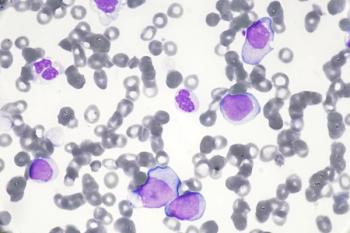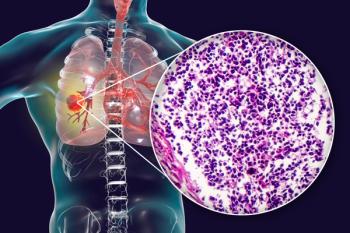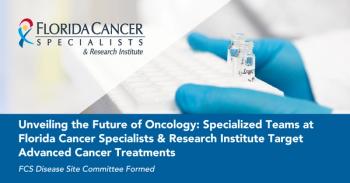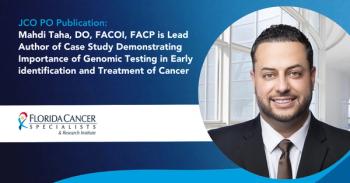
Strengthens Community-Based Oncology Care with Florida Cancer Specialists & Research Institute Core Ventures.

Strengthens Community-Based Oncology Care with Florida Cancer Specialists & Research Institute Core Ventures.

Continuing education supports pharmacy technician career advancement, retention, and skill development.

Medically integrated pharmacies improve collaboration, patient care, communication, and therapy management.

The high acceptance rates of these interventions demonstrate the key role in optimizing patient care that clinical oncology pharmacists with access to medical records play.

The drug solidifies its place as a first-line treatment option in AML.

The program develops patient-centered oncology pharmacists through comprehensive training.

Advancements include novel combination therapies and improved diagnostic techniques.

An overview of current FDA-approved ROS1-targeted therapies.

Multiple P13K inhibitors have showed promise in treating genetically-mutated forms of breast cancer.

Collaboration between community centers and academic medical centers can improve patient access to these complex therapies.

Key opinion leaders (KOLs) provide key takeaways on metastatic breast cancer and early breast cancer, emphasizing the enthusiasm surrounding recent advances in the field and the potential for improved patient outcomes.

The panelists share their concluding thoughts on the importance of collaboration between academic and community practices to achieve the best outcomes for their patients, which includes seeking second opinions and incorporating insights from tumor board discussions.

Medical experts discuss their perspectives on therapy approval and the significance of formulary inclusion, emphasizing the need to carefully consider both toxicities and benefits, which may ultimately lead to the operationalization of a drug in clinical practice.

Key opinion leaders (KOLs) discuss the use of CDK4/6 inhibitors in early breast cancer, specifically in patients who have undergone chemotherapy and surgery. They highlight the key factors that help determine which patients are most likely to benefit from receiving these medications.

The panelists discuss the clinical and economic factors that influence treatment decisions for early breast cancer (eBC), as well as the differences between eBC and metastatic breast cancer (mBC) in terms of adverse event management protocols and strategies for optimizing patient adherence.

Heather Moore, BCOP, CPP, PharmD, discusses the importance of treatment for early breast cancer, highlighting the use of chemotherapy followed by endocrine therapy. She notes that CDK4/6 inhibitors are being added for higher-risk patients, and oral selective estrogen receptor degraders may also be used in advanced cases.

Frank Scimeca, PharmD, MBA, BCOP, discusses the crucial collaborative effort between academic and community practices in managing and monitoring patients receiving CDK4/6 inhibitors, emphasizing the importance of communication and coordination to ensure optimal patient care.

Biological therapy involves the use of living organisms, substances derived from living organisms, or laboratory-produced versions of such substances to treat disease.

Sarah Rockwell, PharmD, BCOP, and Ke Ning, MD, share their concluding remarks, reflecting on the current landscape and expressing their aspirations for addressing remaining unmet needs.

Ke Ning, MD, describes similarities and differences when implementing bispecific antibodies and CAR T-cell therapy for patients with relapsed or remitting multiple myeloma in the community oncology setting.

Medical professionals highlight the essential support provided by pharmacists in addressing operational challenges related to bispecific antibodies. Pharmacists can play an important role in the development of policies and procedures, monitoring and management of toxicities, and delivery of educational resources.

37 Cutting-Edge Study Results Presented at Global Gathering, 6 Oral Presentations.

Heather Moore, BCOP, CPP, PharmD, discusses switching from CDK4/6 inhibitors to later lines of therapy, typically due to toxicities, to alleviate symptoms. She emphasizes the goal of finding a new therapy rather than abandoning treatment altogether, and notes that targeted therapy may be necessary in cases of disease progression.

Frank Scimeca, PharmD, MBA, BCOP, discusses strategies for implementing cost-saving measures and utilizing patient assistance programs to help patients access therapy, while emphasizing the importance of mitigating financial toxicities for patients.

Sarah Rockwell, PharmD, BCOP, explores how community oncology practices can understand and meet the requirements of risk evaluation and mitigation strategy programs, and stresses the importance of developing and implementing standard operating procedures.

Key opinion leaders address the importance of coordination between academic hospital providers and community oncologists when transitioning from initiation of bispecific antibodies at a tertiary hospital to maintenance therapy in the community oncology setting.

FCS is proud to announce an initiative aimed at revolutionizing cancer care—the introduction of designated FCS Disease SiteTeams for late-phase research and the subsequent formation of the FCS Disease Site Committee.

The expert panel explores the importance of communication and collaboration among care providers when patients with multiple myeloma who are receiving treatment with bispecific antibodies navigate transitions of care to and from various healthcare settings.

Medical professionals share insights on treatment considerations and patient selection for bispecific antibody therapy and the process for referring patients to other institutions for care.

Findings Published in International Oncology Journal.